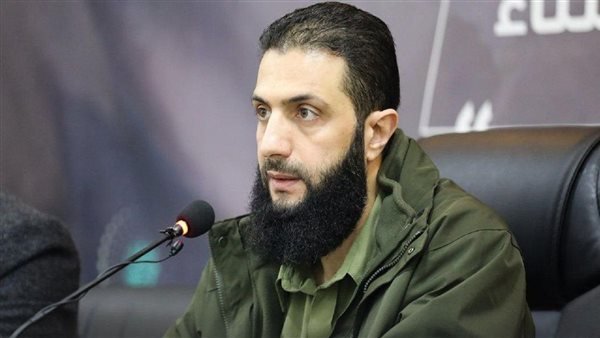
The events and tensions taking place in Syria continue to dominate the international scene, in light of the rapid development of events and battles, within the civil war between the army Syrian And armed factions.
Who is Abu Muhammad al-Julani, accused of igniting the civil war in Syria?
Last Wednesday, armed factions, led by Hay’at Tahrir al-Sham, formerly the Al-Nusra Front, invaded villages and towns in Aleppo Governorate, which is controlled by the Syrian government, led by Abu Muhammad al-Julani, and in the following lines we will discuss the most important information about him.
Who is Abu Muhammad al-Julani, leader of Jabhat Tahrir al-Sham?
Over the past twelve years, Syrian Abu Muhammad al-Jolani has worked to reshape his public image and that of the insurgency he leads, abandoning his long-standing ties to al-Qaeda and consolidating his power before emerging from the shadows.
Now Al-Julani, 42, is seeking to seize the moment again, leading his fighters in an attack that helped capture Syria’s largest city, reigniting the country’s long civil war and plunging it into darkness.
According to the Associated Press, Al-Julani’s success on the battlefield comes after years of maneuvers he waged among extremist organizations in which he eliminated his rivals and former allies, leading the armed factions in the final attack.
The report indicated that Al-Julani moved during this to distance himself from Al-Qaeda, polish his image, and used the actual rescue government established by his extremist group in an attempt to win over international governments and religious and ethnic minorities in the country.
Al-Julani’s efforts also sought to expand his group’s public support and legitimacy, by presenting himself as a champion of pluralism and tolerance to rebrand it. However, it has been years since Syrian armed factions, based in the northwest of the country, made any significant military advances against Assad.
The report indicated that the Syrian President’s government, with the support of Iran and Russia, maintained its control over about 70% of the country, which left Al-Julani in a state of stagnation, along with his terrorist group Hay’at Tahrir al-Sham – formerly Al-Nusra, outside the spotlight.
Al-Julani’s relations with Al-Qaeda go back to 2003, when he joined the extremists fighting American forces in Iraq. He was also arrested several times by the American army, but he remained in Iraq.
During that time, Al Qaeda seized control of like-minded groups and formed the extremist group ISIS in Iraq, led by Abu Bakr al-Baghdadi. In 2011, the popular uprising against Assad in Syria led to a crackdown and, on the other hand, an all-out war with armed factions and militias. .
Al-Julani’s fame increased when Al-Baghdadi sent him to Syria to establish a branch of Al-Qaeda called the Al-Nusra Front. The United States classified the new group as a terrorist organization, and this classification still exists today, and the American government has placed a reward of ten million dollars for anyone who provides information about him.
As the civil war in Syria intensified in 2013, so did al-Julani’s ambitions. He defied al-Baghdadi’s calls to disband the Nusra Front and merge it with al-Qaeda’s operations in Iraq, to form ISIS.
However, Al-Julani declared his allegiance to Al-Qaeda, which later distanced himself from ISIS. The Nusra Front fought a battle against ISIS and eliminated many of its rivals among Assad’s Syrian armed factions.
In his first interview in 2014, Al-Julani kept his face covered, and told a correspondent of the Qatari Al Jazeera network, that he rejects political talks in Geneva to end the conflict, and said that his goal is to see Syria ruled by Islamic law, as he put it, and made clear that there is no place for the Alawite and Shiite minorities. Druze and Christians in the country.
In 2016, Al-Julani revealed his face to the public for the first time in a video message in which he announced that his group had renamed itself Jabhat Fatah al-Sham and severed its ties with Al-Qaeda. He said in the video, in which he was filmed wearing a military uniform and a turban: This new organization has no affiliation to any… An external entity, this move paved the way for Al-Julani to assert full control over the fractured armed groups.
A year later, his coalition renamed itself again as Hay’at Tahrir al-Sham after other groups merged with it, which strengthened al-Julani’s power in the Idlib governorate in northwestern Syria. After that, Hay’at Tahrir al-Sham clashed with independent Islamist militants who opposed the merger, which emboldened al-Julani. And his group aims to become a major force in northwestern Syria.
As his power consolidated, Al-Julani launched a transformation, replacing his military uniform with a shirt and pants, and began calling for religious tolerance and pluralism, appealing to the Druze community in Idlib, which had previously been targeted by the Nusra Front, and visiting the families of Kurds killed by Turkish-backed militias.
In 2021, Al-Julani gave his first interview with an American journalist on PBS, and the leader of Hay’at Tahrir al-Sham, who wore a jacket, said that his group poses no threat to the West and that the sanctions imposed on it are unfair.
He said: Yes, we criticized Western policies, but waging a war against the United States or Europe from Syria is not right. We did not say that we want to fight.



